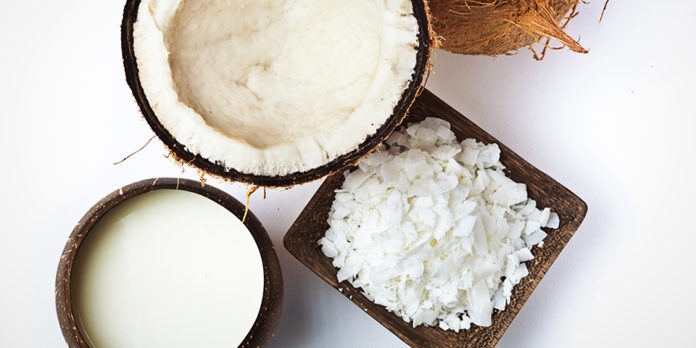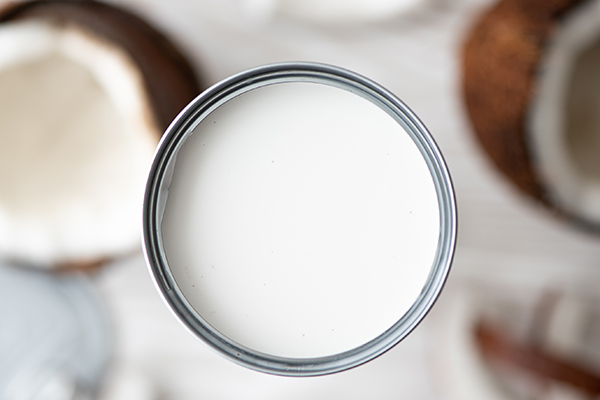Creamy coconut milk is a delicious, dairy-free alternative — but it might make you think twice because it’s high in calories and saturated fat.
Let’s take a closer look at coconut milk nutrition and how it stacks up against other milks.
What Is Coconut Milk?
Coconut milk is made by extracting the grated white pulp of coconuts and soaking it in hot water at a 1:1 ratio.
The result is a thick white liquid with a creamy layer at the top — that’s the coconut cream, the most concentrated form of coconut milk.
True coconut milk is typically sold in a can and is what you’d use for rich curries and soups.
By adding more water into the mix, manufacturers can make “light coconut milk.”
They add even more water to make the drinkable carton of coconut milk beverage you often see next to other dairy-free milk alternatives.
It should be noted that coconut milk beverage and other options like rice, almond, and hemp milks are not considered dairy because their nutrition content is not similar to milk or fortified soy beverages.
Coconut Milk Nutrition
Coconut milk nutrition varies a lot depending on if it’s in can or carton form.
According to Brittany Crump, M.P.H., R.D. at Savor Nutrition, “Carton coconut milk is diluted with water to make it more drinkable. Canned coconut milk has a much higher percentage of fat.”
Canned coconut milk is very high in calories — a cup contains:
- 552 calories
- 57 grams of fat
That’s more than whole milk!
Note that 89% of the calories in canned coconut milk is saturated fat, which experts recommend limiting to improve heart health.
That could be why these milks are generally used for cooking in recipes like this curry.
On the other hand, a cup of diluted coconut milk from a carton contains:
- 40 calories
- 4 grams of fat
It’s very comparable to unsweetened almond milk. Unless sugar is added, coconut milk is naturally low in sugar.
However, coconut milk beverage is slightly higher in fat than almond milk.
Is Coconut Milk Healthier Than Milk?
Diluted coconut milk from a carton can be similar to cow’s milk since manufacturers fortify with vitamins A, D, E, calcium, and even B12.
Generally speaking, it will still contain less protein than cow’s milk.
Whether one milk is better for you than the other depends on your needs. Coconut milk works better for:
- Vegan or vegetarian lifestyles
- Lactose-intolerant individuals
- Milk protein allergies, and an alternative for those with nut allergies
With diluted coconut milk, fat and saturated fats are less of an issue unless you’re chugging massive amounts.
Experts recommend limiting saturated fat to less than 10% of your daily calories, so 1-2 cups of coconut milk a day is still reasonable.
Is Coconut Milk a Healthy Fat?
That certainly depends on who you ask.
A 2016 New York Times survey once illustrated this difference in opinion: 72% of Americans rated coconut oil as healthy compared to just 37% of nutritionists.
Why the controversy?
Because 80-90% of coconut oil is saturated fat, and the same goes for canned, undiluted coconut milk.
Saturated fat is known to increase LDL, also known as “bad” cholesterol, which can block arteries over time and lead to heart disease.
Those who defend coconut fat claim that it’s unfair to treat all saturated fat the same.
The saturated fat from coconuts is primarily lauric acid, a medium-chain triglyceride (MCT). Because it’s an MCT, some research argues that:
- Coconut fat is more likely to be burned as energy than stored as fat.
- Coconut fat also raises HDL, the “good” cholesterol.
The defense claims are important, but more research is needed to confirm them.
In the meantime, most health organizations take a conservative stance by recommending we use coconut fats sparingly.
Among them are the Mayo Clinic, American Heart Association, American Diabetes Association, and the Academy of Nutrition & Dietetics.
Crump explains, “Yes, you can have saturated fat in small quantities, but it’s better if you can replace it with foods that contain unsaturated fats.”
How to Use Coconut Milk
Canned coconut milk is best used in moderation. Treat it like you would heavy whipped cream or half-and-half.
If you like it, add one to a few spoonfuls to your coffee, oatmeal, or smoothie. Use it sparingly to enhance curries and soups.
Crump says, “My favorite way to use coconut milk is in smoothies. I can enjoy the creamy taste by adding just a small amount along with nutritious things like blueberries and chia seeds.”
Since it’s more diluted, coconut milk beverage from a carton can be consumed similar to almond milk or low-fat cow’s milk.
Takeaway: Coconut milk can be high in calories and saturated fat.
Enjoy it in moderation alongside a balanced diet, and you should be good to go!
| Canned Coconut Milk (1 cup) | Silk Unsweetened Coconut Milk Beverage (1 cup) | Whole Milk (1 cup) | |
| Calories | 552 | 40 | 146 |
| Fat (g) | 57.2 | 4 | 8 |
| Saturated fat (g) | 50.7 | 3 | 7.8 |
| Carbohydrates (g) | 13.3 | 1 | 11.4 |
| Fiber (g) | 5.3 | 0 | 0 |
| Protein (g) | 5.5 | 0 | 8 |
| Vitamin A (mcg) | 0 | 180 | 78.1 |
| Vitamin E (mg) | 0.2 | 3 | 0.1 |
| Vitamin D (mcg) | 0 | 2 | 3 |
| Vitamin B12 (mcg) | 0 | 0.9 | 1.3 |
| Calcium (mg) | 38.5 | 460 | 300 |
| Iron (mg) | 4 | 0.5 | 0 |
| Magnesium (mg) | 88.9 | Not listed | 29.3 |
| Potassium (mg) | 631 | 310 | 366 |
| Copper (mg) | 0.6 | Not listed | 0 |
| Selenium (mcg) | 14.9 | Not listed | 4.6 |



























